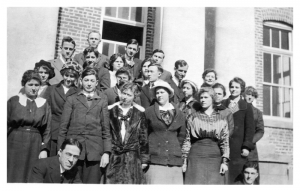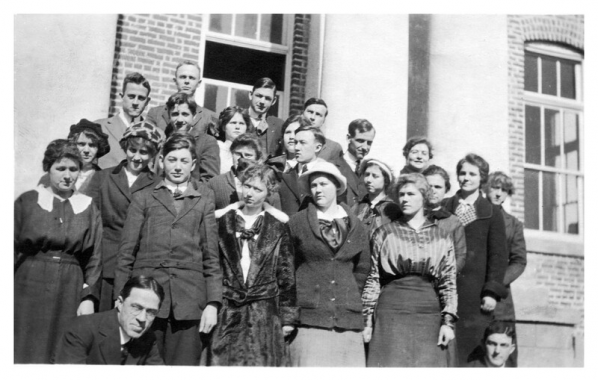Stop by the fourth floor of the Belk Library and Information Commons and check out an exhibit featuring 125 years of Appalachian State University history. The exhibit surveys a small portion of historical events and how global and social changes driven by university community members affected the rural state institution. It is not a comprehensive historical narrative but rather an exploration of catalysts of change.
Starting in the late 19th century, an expanding public education movement in the United States led to the founding of Watauga Academy (1899-1903), created to train teachers for rural mountain areas. The school fostered a sense of pride for the Watauga area, and this connection with the community helped the school advance. When the school became Appalachian Training School (1903-1925), a state institution, Watauga community members donated funds and supplies to build the new building. The school continued to share progress with the community. Farmland was purchased, and the New River Light and Power Company provided electricity to the campus and six community members.
Appalachian State University Libraries Digital Collection: Historical photos
The exhibit describes how the institution navigated WWI's societal and educational impacts and the Spanish Influenza quarantine. Following the war, there was a shortage of teachers, and the North Carolina General Assembly encouraged the school to train elementary school teachers. The school met this directive by becoming Appalachian State Teachers College (1925-1967).
More challenges were faced with the onset of the Great Depression, a period of economic hardship, and the school was able to keep food costs down by sourcing food from its farms.
When World War II began in 1941, the school connected with the community to join the war effort. The White House encouraged food rationing and the purchase of war bonds. Some students were drafted into the armed service, while others wrote to loved ones overseas. The Home Economics department aided with food and monetary ration education by hosting community events. When the war was over, men returned home, and enrollment increased.
UA.22.02: Alumni Affairs scrapbooks
The exhibit covers the institution's history and students' pivotal role in shaping it. It delves into the dress rules during the 50s and 60s and how students took the initiative to have control of their voice and narrative. On July 1, 1967, the institution grew to become Appalachian State University (1967-present) and became a part of UNC's system in 1971. Diverse student organizations were created, and free speech was continuously addressed. Student groups protested the Vietnam War and the draft. Title IX of the Civil Rights Law prohibited sex-based discrimination in federally funded educational institutions. Special interest groups were formed on campus, including the Organization on the Status of Women, which was formed by faculty. Subsequently, the Women's Resource Center was established. African-American students were increasingly voted into positions of power, and students pushed for environmental awareness. A Women's Studies minor was implemented, and the official status of the Gay Awareness Organization was granted. The students' influence on the institution's history is undeniable.
UA.107: Cultural, Global, and Gender Studies records
During the 1980s, students continued to use their voices to enact changes on campus. However, not all sought-after changes were made, as evidenced by the 1986 student demand that the university refrain from purchasing South African goods. The exhibit continues and covers the Appalachian State history up to January 2024. If you would like to view the mentioned collections, request an appointment at the Special Collections Research Center. on the fourth floor of the Belk Library at the Boone campus, or for more information, contact spcoll@appstate.edu | 828.262.4041.
- Contributed by Angela Ocuto Howell, Manuscripts and Archives Processor

